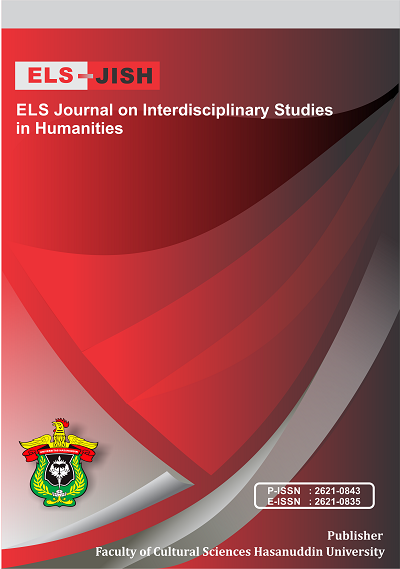Unveiling the Potential of Quipper School: A Study on Student Engagement in English Subject
DOI:
https://doi.org/10.34050/els-jish.v7i4.41940Keywords:
Students Perception, Quipper School, Advantages, DisadvantagesAbstract
This study investigates students' perceptions of Quipper School as an online learning platform and examines its strengths and limitations as an educational medium. Utilizing a descriptive qualitative methodology, informed by L.R. Gay’s framework, data were collected through semi-structured interviews with 6 students from SMAN 8 Makassar. The findings indicate that Quipper School offers several advantages, including free access to instructional videos, a user-friendly interface, comprehensive content delivery, and features that facilitate self-assessment through tasks, quizzes, and summaries. Despite these benefits, challenges were identified, such as network connectivity issues, problems with image display, software glitches, unclear instructional explanations, and language barriers. Overall, Quipper School is perceived as an accessible, user-friendly, and cost-effective tool that enhances the online learning experience.
References
Agustina, D., & Cahyono, B. Y. (2017). Perception of Indonesian teachers and students on the use of Quipper School as an online platform for extended EFL learning. Journal of English Language Teaching, 12(2), 45-59.
Al-Obaydi, L. H., Jawad, Z. A., & Rahman, F. (2022). Class-home Connection Using Communication Technology and its Impact on Anxiety Reduction and Academic Performance. Al-Adab Journal, (141), 53-66.
Baresh, E. F. (2022). Developing Libyan Undergraduates’writing Skills Through Reflective Journaling: A Critical Literature Review. Journal of English Language Teaching and Learning, 3(1), 27-35.
Buntoro, M., et al. (2018). Pemanfaatan E-Learning Quipper School Oleh Guru Dan Siswa Untuk Optialisasi Pembelajaran Di MAN 1 Ponorogo. Jurnal Pendidikan, 5(1), 35-42.
Darmawan, A. (2013). Information and communication technology in education: A review of definitions and strategies. Indonesian Journal of Education and Technology, 4(2), 112-118.
Elisa, A. (2016). The role of internet availability in improving educational access in schools. Journal of Educational Technology, 10(3), 1-6.
Gay, L. R., Mills, G. E., & Airasian, P. (2012). Educational research: Competencies for analysis and applications (10th ed.). Pearson Education.
Hurriyati, D., & Arysandy, T. (2018). Quipper School and its impact on students' interest and learning outcomes. Journal of Educational Research, 8(1), 55-64.
Mahariyanti, Y., & Suyanto, S. (2018). The effectiveness of using Quipper School teaching materials towards students’ cognitive outcomes in eleventh grade students of MIPA. Journal of Education and Learning, 11(4), 130-139.
Musmuliadi, A. (2020). Student responses to the use of Quipper School in enhancing learning motivation. International Journal of Educational Technology, 12(2), 67-75.
Rachma, N. (2021). Teacher and students' perception towards the implementation of Quipper School in English subject. Journal of Language Education and Teaching, 14(2), 40-47.
Rahman, F. (2017). The revival of local fairy tales for children education. Theory and Practice in language Studies, 7(5), 336.
Said, M. M., Rita, F., Weda, S., & Rahman, F. (2021). English Language Performance Development Through Extracurricular Activities at Faculty of Teacher Training and Education Tadulako University Palu. PalArch's Journal of Archaeology of Egypt/Egyptology, 18(08), 388-403.
Septinawati, D., Wibowo, A., & Darmawan, E. (2020). Students’ perception towards the implementation of Quipper School as an e-learning platform in teaching English. Journal of English Language and Education, 12(3), 99-106.
Sukmawaty, Rahman, F. F., & Andini, C. (2022). Covid-19 Pandemic and Axiology of Communication: A Study of Linguistic Phenomena. IJISRT, 7(4).
Sutopo, H. (2012). Communication technology: Definitions and applications in education. Indonesian Journal of Communication Studies, 5(3), 112-118.
Waller, L., & Wilson, L. (2001). E-learning: The evolution and its impact on traditional education. Educational Technology Research Journal, 7(4), 25-34.
Wardina, D. (2002). The role of information technology in decision-making processes in business and education. Journal of Business and Technology, 15(1), 22-29.
Weda, S., Atmowardoyo, H., Rahman, F., & Sakti, A. E. F. (2021). Linguistic aspects in intercultural communication (IC) practices at a higher education institution in Indonesia. Eroupean Language Scientific Journal, 14(2), 76-91.
Weda, S., Rahman, F., Samad, I. A., Gunawan, F., & Fitriani, S. S. (2022). How Millennials Can Promote Social Harmony through Intercultural Communication at Higher Education. Randwick International of Social Science Journal, 3(1), 231-243.
Yaumi, M. T. A. H., Rahman, F., & Sahib, H. (2023). Exploring WhatsApp as Teaching and Learning Activities during Covid-19/New Normal era: A Semiotic Technology Analysis. International Journal of Current Science Research and Review, 6(12), 7627-7634.
Yaumi, M. T. A. H., Rahman, F., & Sahib, H. (2024). Bridging Language and Technology through Semiotic Technology. International Journal of Social Science Research and Review, 7(1), 52-61.
Youngsun, K., Sosrohadi, S., Andini, C., Jung, S., Yookyung, K., & Jae, P. K. (2024). Cultivating Gratitude: Essential Korean Thankfulness Phrases for Indonesian Learners. ELS Journal on Interdisciplinary Studies in Humanities, 7(2), 248-253.
Downloads
Published
How to Cite
Issue
Section
License
Copyright (c) 2024 Rasyita

This work is licensed under a Creative Commons Attribution-ShareAlike 4.0 International License.






